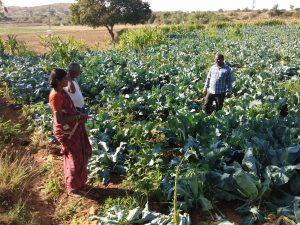SCALING BIG DATA IN AGRICULTURE
Small and marginal farmers account for more than 86.2 % of all farmers in India. With fragmented land holdings, depleting natural resources and climatic variations, the marginal farmers have experienced prolonged low productivity and inefficient production. Actors including the state, civil society, nonprofits are working in their own capacity and in tandem to address the livelihood problems of small and marginal farmers. The common thread of solution that resonates across the ecosystem is the need for innovation. Big data could be the innovation that would trigger the paradigm change in achieving efficient agricultural production in the context of developing countries. There are existing platforms that have already leveraged agricultural production with the aid of big data around the world. Picture Based Insurance (PBI) by International Food and Policy Research Institute (IFPRI) is one such innovation which aims to deliver comprehensive crop insurance to the farmers with the use of their smartphones. Farmers capture pictures of their crop cycle from sowing to harvest. The extent of damages is then measured and the insurance payments are made directly to their bank accounts. This in turn creates a platform for leveraging the data from the farmers to develop sustainable cropping practices.
Big data are large sets of structured and unstructured data from various sources ranging from administrative data, survey data, satellite data and user data from various platforms which can be computed and made sense statistically to understand patterns. For example, patterns from large sets of weather data can be used to predict natural disasters. Through a combination of information analytics and affordable technology, insights from big data can enable farmers to reduce the information asymmetry on efficient agricultural practices. In the Indian context, the past decade has seen a spur in growth of AgriTech innovations. Agri tech solutions leverage data from a wide range of data sources and provide precise advisory to farmers in cropping pattern, soil usage, fertilizer applications and harvesting cycles. Big Data is one of the key factors to sustainable farming, for instance Geographical Information Systems (GIS) enabled technical support enables farmers to increase productivity of the land without expanding agricultural land. This article tries to focus on key challenges and approaches to address those challenges at the ecosystem level in order to enable scaling of Artificial Intelligence for the benefit of smallholder farmers.
 While big data cannot be considered as a silver bullet to solve the agricultural crisis in India. Application of big data in tandem with the existing agricultural interventions might prove fruitful and ensure sustainability of the solution in the long run. One approach could be a model in which the AgriTech companies could work with the farmer cooperatives. Farmer cooperatives are one of the most successful interventions in the Indian agriculture space that harnessed the strength of the communities. Through collaboration with the cooperatives, AgriTech companies can achieve reach to gather quality farm level data from individual farmers. The cooperatives in turn can create a value chain where the farmer’s information and data are translated to income.
While big data cannot be considered as a silver bullet to solve the agricultural crisis in India. Application of big data in tandem with the existing agricultural interventions might prove fruitful and ensure sustainability of the solution in the long run. One approach could be a model in which the AgriTech companies could work with the farmer cooperatives. Farmer cooperatives are one of the most successful interventions in the Indian agriculture space that harnessed the strength of the communities. Through collaboration with the cooperatives, AgriTech companies can achieve reach to gather quality farm level data from individual farmers. The cooperatives in turn can create a value chain where the farmer’s information and data are translated to income.
There are also considerable challenges in leveraging big data in the Indian agricultural context. The question of ownership, targeting beneficiaries for advisory and technological infrastructure in the rural areas seem to pose a big challenge in the context of India. Most of these problems can be addressed and the solutions can be further enabled through a systems approach. With contributions from different stakeholders in the ecosystem, the problem of collection of quality data, institutions for regulation on ownership of data and implementation of advisory solutions can be addressed in the long run.
Big data and AI technologies have sparsely made inroads in rural India. With an ecosystem approach big data and related technology can be adopted, enabled and scaled up to reach a large population of marginal farmers. Indian nonprofits have proved time and again on their capability to scale up innovative solutions to achieve impact. Scaling up big data and AI in the agricultural space will not only enable marginal farmers in providing them backward linkages through inputs and advisory but also enabling them in forward linkages in identifying consumption gaps and patterns that exist in the market to produce efficiently and increase their income levels. The impact of big data in other fields such as health, urban infrastructure, education have already created ripples across their sector. Big data is both an opportunity and challenge that can’t be looked away in the agricultural sector. Collaboration and partnerships are the key in leveraging big data and AI technology for the marginal farmers in the Indian agricultural space.
The author, Nelson Mathews is a Research Analyst with Catalyst Management Service


